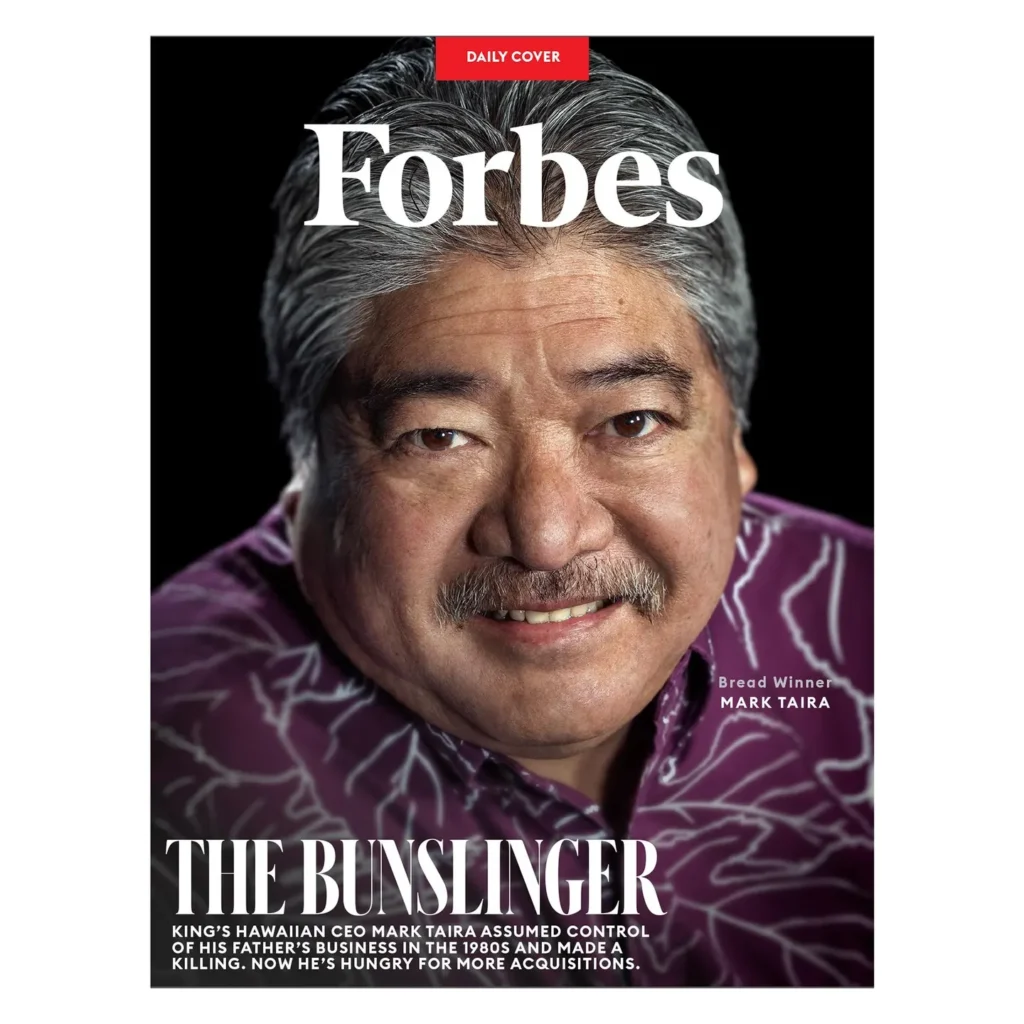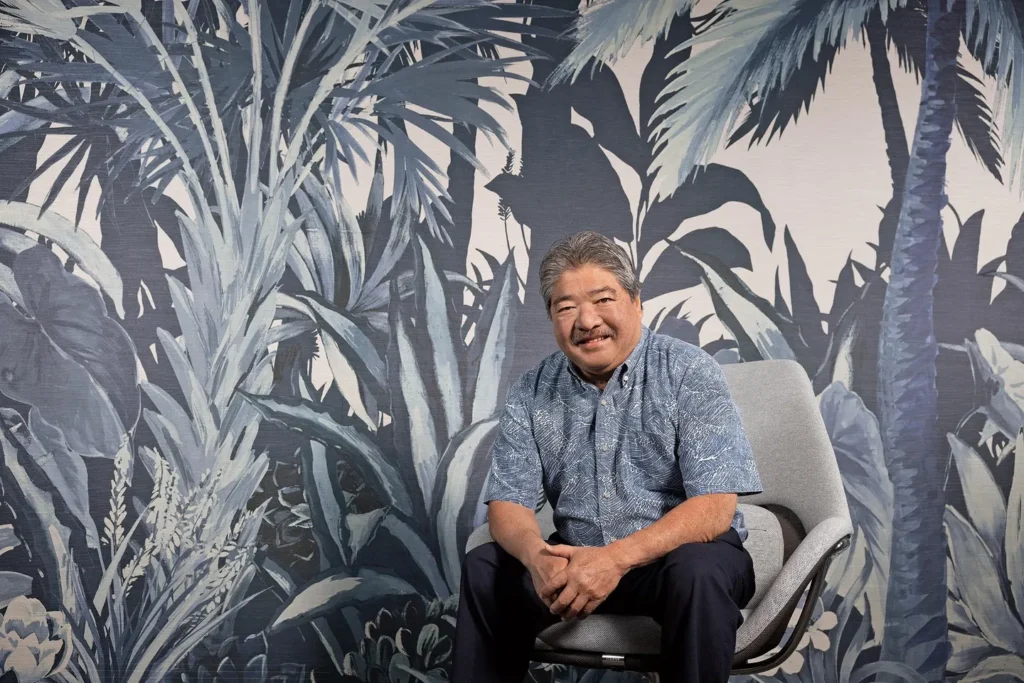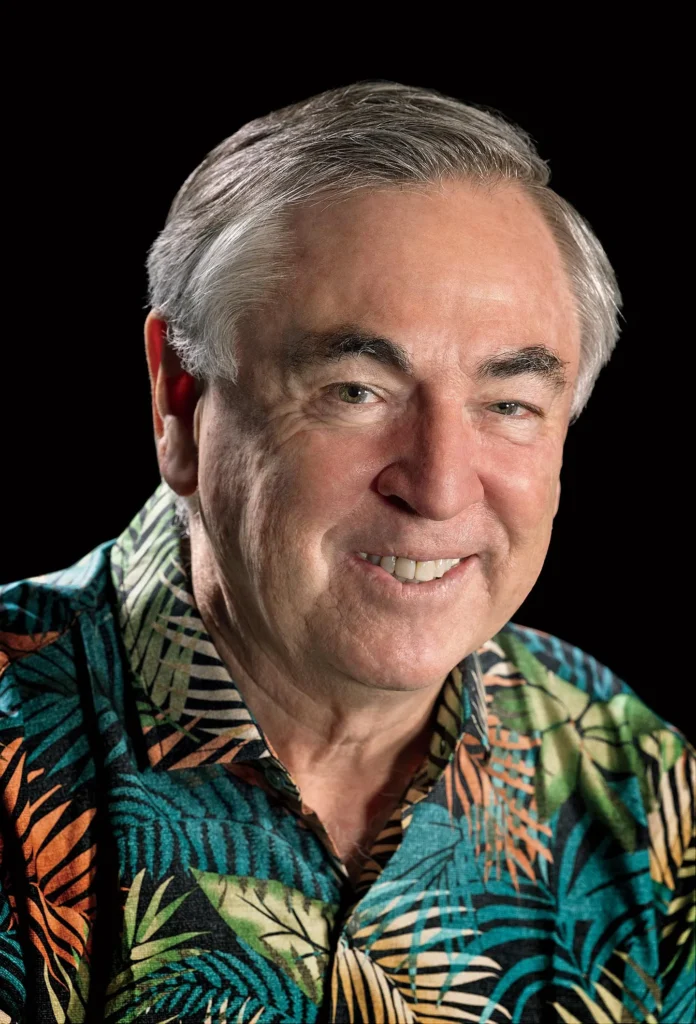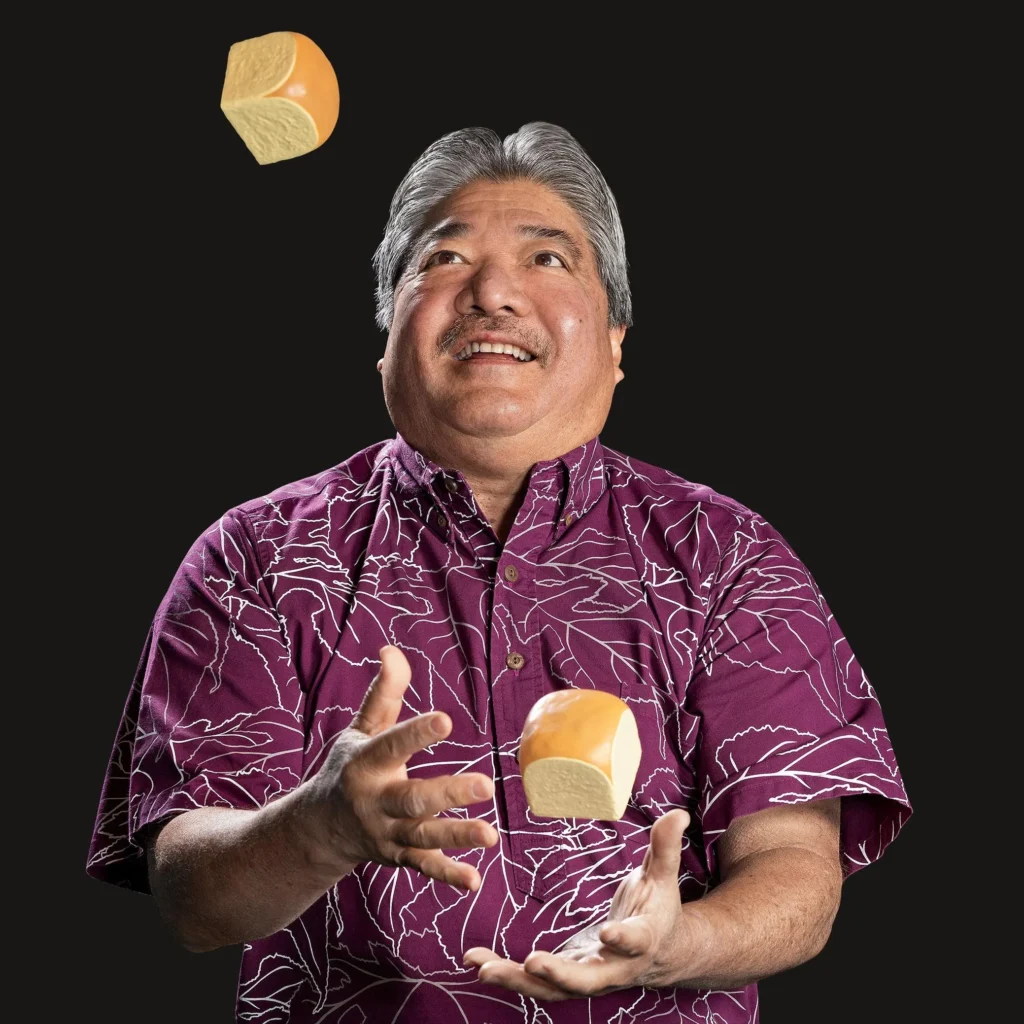Surrounded by the sweet aroma of baking bread, infused with the delightful notes of sugar and butter, the King’s Hawaiian factory in Torrance, California, operates as a bustling hub. Mark Taira, a 67-year-old Hawaii native and the CEO of the bakery since 1983, leads a tour through the facility. Amidst the cacophony of conveyor belts, grinding gears, and bread-kneading machines, Taira pauses to savor the scent, dressed in a blue tropical-print shirt beneath his white factory smock and hard hat. With an expert eye, he appreciates not just the mechanical flow but also the contents of the bag in his hands, tearing into a fresh pack of rolls that releases a waft of steam.
“For me, the best way to enjoy our famous rolls is straight off the line,” Taira declares with a grin, taking enthusiastic bites. The factory produces a staggering amount – 13,000 pounds of King’s Hawaiian bread every hour, six days a week. Additionally, the company operates a sizable facility in Georgia, catering to the East Coast.

YURI HASEGAWA FOR FORBES
King’s Hawaiian, led by Mark Taira, rakes in approximately 85% of its annual $900 million revenue from its iconic buns, while the remainder comes from condiments and beverages, boasting over 40% gross profit margins, as estimated by Forbes. Taira emphasizes the company’s conservative debt-to-Ebitda ratio, claiming it is as low as 1.5 times, half that of most industry peers. Although some competitors achieve higher margins, Taira, unfettered by external shareholders, prioritizes ethical business practices over maximizing profits, embodying his father’s advice: “Never be greedy.”
This philosophy has propelled King’s Hawaiian from a $3 million annual revenue business in Taira’s early days as CEO to a thriving brand with a cult following, witnessing a 15-fold revenue increase in the last two decades. Under the umbrella of Irresistible Food Group, established in 2021, the Taira family expanded into new ventures, including Hawaiian-grown tea, pickles, and a Hawaiian-inspired restaurant concept—all while maintaining 100% family ownership. Forbes estimates the extended Taira family, including 93-year-old board member Tsuneko and four siblings, to be worth $2 billion.
King’s Hawaiian has become a household name, capturing the attention of grocers, competitors, and investors. Wayne Wu of VMG, a San Francisco-based venture and private equity firm, recognizes King’s Hawaiian as an iconic brand, expressing a desire to find similar investment opportunities. The brand’s 12-pack of rolls ranks as the second-best-selling item in American grocery stores during Thanksgiving and Christmas, only surpassed by a 12-pack of Coca-Cola cans. Additionally, during Easter ham season, King’s Hawaiian rolls claim the third spot, trailing Land O Lakes butter and Coke.

The Past Lane: Taira’s company headquarters in Torrance, California (formerly Toyota’s HQ), is filled with memorabilia—from an Apprentice episode featuring King’s Hawaiian to ads with Peyton and Eli Manning.YURI HASEGAWA FOR FORBE
Taira envisions expanding King’s Hawaiian’s presence to more occasions, targeting events like the Super Bowl, where he aims to establish “Slider Sunday” as a culinary tradition similar to Taco Tuesday. Additionally, he sets his sights on grilling holidays such as the Fourth of July and Labor Day. While customers traditionally purchased rolls mainly during Thanksgiving, Christmas, and New Year’s, Taira’s strategic initiatives have diversified the sales calendar, with only 40% of annual sales now tied to these holidays, compared to 60% a decade ago.
Wayne Wu acknowledges that King’s Hawaiian has achieved what every aspiring food brand dreams of, emphasizing the brand’s unique strength lies in its patient and meticulous approach to building a robust foundation. Taira’s methodical approach, building the brand brick by brick, has created a stronghold that withstands challenges, making the house metaphorically impervious to destruction.
The roots of King’s Hawaiian trace back to a sugar plantation on Hawaii’s Big Island before statehood in 1959. Robert Taira, the founder, grew up in a large family of immigrants from Okinawa, Japan. Following his service as a translator in Japan after World War II, Robert, inspired by the joy people found in baked goods, decided to become a baker. In 1950, with financial support from his father, he opened Robert’s Bakery in Hilo, Hawaii, crafting soft, round loaves that blended Hawaiian and Portuguese influences. The bakery’s popularity led to a move to Honolulu in 1963, renamed King’s Bakery. The family’s dedication and vision turned it into a bustling establishment known for its tropical chiffon cakes and, shipping thousands of loaves to the mainland, making King’s the top customer of the Honolulu Post Office.
In 1977, Robert and Tsuneko mortgaged their family home to build a bakery outside Los Angeles, aiming to reduce transportation costs. The $3.7 million production facility opened in 1977 but faced initial challenges due to a lack of mainland customers.

On a Roll: King’s Hawaiian is good for a grocery store’s business, says Irresistible Foods Group CEO John Linehan. “I tell ’em sometimes, ‘The reason you made your bonus three years in a row is because of this brand. Don’t ask me for a one-cent price reduction.’ ”YURI HASEGAWA FOR FORBES
Robert Taira’s determination became evident as he hit the streets, discovering that leaving a loaf with a buyer’s secretary often led to requests for more if they enjoyed it. Two years of persistent cold-calling and sample drops paid off when Safeway became King’s first national account in 1979. The brand truly took off when Robert and Mark made a pivotal shift in their signature product, transitioning from full loaves to shareable rolls. After months of experimentation, they settled on pull-apart sweet rolls, launching the iconic 12-pack in 1983.
Mark, taking the helm as CEO later that year, made a bold move by relocating the business from Hawaii and closing the original Honolulu bake shop. He embarked on constructing a 140,000-square-foot plant in Torrance, six times larger than the original. Although Robert passed away in 2003 before witnessing the completion of this successful strategy, by 2005, sales had reached $50 million.
Driven by an appetite for expansion, Taira extended the family business to Georgia, building a state-of-the-art 120,000-square-foot factory outside Atlanta in 2011 with a $65 million loan. This move enabled King’s Hawaiian to profitably deliver rolls to Northeast markets like New York, baked and immediately frozen to maintain a “fresh” quality upon sale.
Even with increased spending on TV and print ads, King’s Hawaiian’s profitability surged, and the family successfully paid down some of the debt incurred in Atlanta. By 2016, revenue had soared to over $320 million, marking a fivefold increase from a decade earlier. Taira’s strategic vision continued with the hiring of John Linehan as the new president in 2016, who instigated changes, especially in the sales department, reducing the staff from 45 to 12 within two months.
As King’s Hawaiian expanded its reach and influence, the family business grew into a conglomerate under the umbrella of Irresistible Food Group in 2021. This conglomerate not only encompasses the iconic sweet rolls but also introduces Hawaiian-farmed tea, pickles, and a Hawaiian-inspired restaurant concept to the product portfolio while maintaining 100% family ownership. Forbes estimates the extended Taira family’s net worth at $2 billion, making them a remarkable success story in the competitive food industry.

